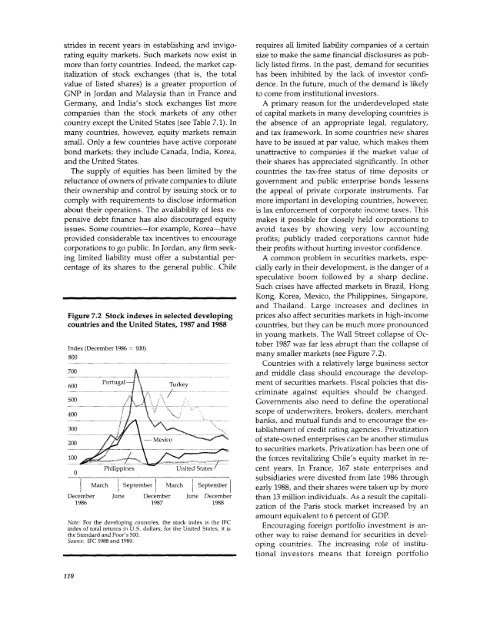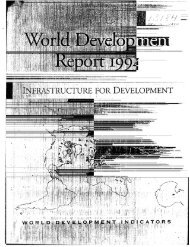Financial systems and development
Financial systems and development
Financial systems and development
Create successful ePaper yourself
Turn your PDF publications into a flip-book with our unique Google optimized e-Paper software.
strides in recent years in establishing <strong>and</strong> invigo- requires all limited liability companies of a certain<br />
rating equity markets. Such markets now exist in size to make the same financial disclosures as pubmore<br />
than forty countries. Indeed, the market cap- licly listed firms. In the past, dem<strong>and</strong> for securities<br />
italization of stock exchanges (that is, the total has been inhibited by the lack of investor confivalue<br />
of listed shares) is a greater proportion of dence. In the future, much of the dem<strong>and</strong> is likely<br />
GNP in Jordan <strong>and</strong> Malaysia than in France <strong>and</strong> to come from institutional investors.<br />
Germany, <strong>and</strong> India's stock exchanges list more A primary reason for the underdeveloped state<br />
companies than the stock markets of any other of capital markets in many developing countries is<br />
country except the United States (see Table 7.1). In the absence of an appropriate legal, regulatory,<br />
many countries, however, equity markets remain <strong>and</strong> tax framework. In some countries new shares<br />
small. Only a few countries have active corporate have to be issued at par value, which makes them<br />
bond markets; they include Canada, India, Korea, unattractive to companies if the market value of<br />
<strong>and</strong> the United States.<br />
their shares has appreciated significantly. In other<br />
The supply of equities has been limited by the countries the tax-free status of time deposits or<br />
reluctance of owners of private companies to dilute government <strong>and</strong> public enterprise bonds lessens<br />
their ownership <strong>and</strong> control by issuing stock or to the appeal of private corporate instruments. Far<br />
comply with requirements to disclose information more important in developing countries, however,<br />
about their operations. The availability of less ex- is lax enforcement of corporate income taxes. This<br />
pensive debt finance has also discouraged equity makes it possible for closely held corporations to<br />
issues. Some countries-for example, Korea-have avoid taxes by showing very low accounting<br />
provided considerable tax incentives to encourage profits; publicly traded corporations cannot hide<br />
corporations to go public. In Jordan, any firm seek- their profits without hurting investor confidence.<br />
ing limited liability must offer a substantial per- A common problem in securities markets, especentage<br />
of its shares to the general public. Chile cially early in their <strong>development</strong>, is the danger of a<br />
speculative boom followed by a sharp decline.<br />
Such crises have affected markets in Brazil, Hong<br />
Kong, Korea, Mexico, the Philippines, Singapore,<br />
<strong>and</strong> Thail<strong>and</strong>. Large increases <strong>and</strong> declines in<br />
Figure 7.2 Stock indexes in selected developing prices also affect securities markets in high-income<br />
countries <strong>and</strong> the United States, 1987 <strong>and</strong> 1988 countries, but they can be much more pronounced<br />
in young markets. The Wall Street collapse of Oc-<br />
Index (December 1986 = 100)<br />
tober 1987 was far less abrupt than the collapse of<br />
800 many smaller markets (see Figure 7.2).<br />
Countries with a relatively large business sector<br />
700 <strong>and</strong> middle class should encourage the develop-<br />
600 Portugal Turkey ment of securities markets. Fiscal policies that dis-<br />
___- -- / -- criminate against equities should be changed.<br />
500 ___ Governments also need to define the operational<br />
400 i } \ X X ; ' 2 scope of underwriters, brokers, dealers, merchant<br />
----------<br />
_-- - -- ¢-t-- banks, <strong>and</strong> mutual funds <strong>and</strong> to encourage the es-<br />
300 tablishment of credit rating agencies. Privatization<br />
200 Mexico<br />
/----t---- i ..<br />
of state-owned enterprises can be another stimulus<br />
to securities markets. Privatization has been one of<br />
100 ' the forces revitalizing Chile's equity market in re-<br />
0 Philippines UnitedStates cent years. In France, 167 state enterprises <strong>and</strong><br />
I<br />
0<br />
March September March September<br />
subsidiaries were divested from late 1986 through<br />
early 1988, <strong>and</strong> their shares were taken up by more<br />
December June December June December<br />
1986 1987 1988<br />
than 13 million individuals. As a result the capitalization<br />
of the Paris stock market increased by an<br />
amount equivalent to 6 percent of GDP.<br />
Note: For the developing countries, the stock index is the IFC Enouraging fori portf i s ns<br />
index of total returns in U.S. dollars; for the United States, it is Encouraging foreign portfolio investment is anthe<br />
St<strong>and</strong>ard <strong>and</strong> Poor's 500.<br />
other way to raise dem<strong>and</strong> for securities in devel-<br />
Sou(rce: IFC 1988 <strong>and</strong> 1989.wa<br />
oping countries. The increasing role of institutional<br />
investors means that foreign portfolio<br />
110
















